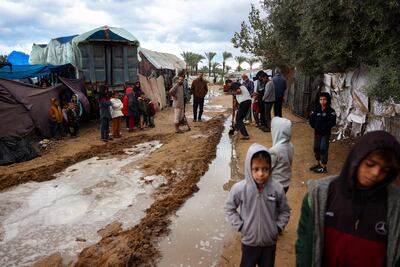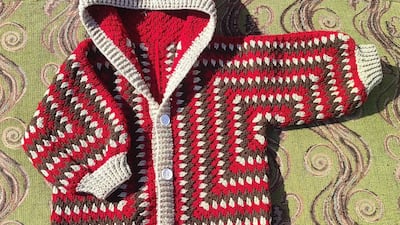Live updates: Follow the latest on Israel-Gaza
“I want to show my mother!” shouted a Gazan boy as he ran away laughing, after Aseel Al Khaldi made him a jacket out of yarn.
The youngster is one of many in the Palestinian enclave to have received handmade clothing from Ms Al Khaldi, who has been navigating Israeli bombings, hours-long walks and shortages of materials to produce winter garments for suffering children, as temperatures plummet.
Ms Al Khaldi, 26, was a graphic designer in Al Nasr, in western Gaza city, northern Gaza, before the war broke out in October last year.
A few months before the fighting began, she started learning how to crochet while pregnant with her second son, with the idea of crafting items she could leave for him as keepsakes from when he was a baby.
She soon started her own business as a crochet artist after receiving encouragement from people impressed with her intricate work. Ms Al Khaldi began making a variety of items, ranging from handbags to mug warmers to dolls.
More than a year later, Ms Al Khaldi's business and home have been destroyed by war and she has been displaced to the south of Gaza, but she is still making clothes. As the conflict rages on, she has turned her crocheting skills to help protect children from the harsh winter conditions.
“I was very happy with my business, it was a great success and orders began pouring in, but in one day, we woke up to bombs, murder and destruction,” she told The National.

Materials have been scarce and expensive since the outbreak of war, and Ms Al Khaldi lacked even the most basic of tools to make the garments; a crochet hook. To overcome that, her brother improvised by carving wooden chopsticks into a hook.
Initially, Ms Al Khaldi only had enough yarn to make clothes for her own children. But after an outpouring of support for her work through videos she posted online, people began reaching out, asking if she could make clothes for their children.
“I was happy to do that but it was obvious that materials were no longer available, so I was contacting shops almost every day … With difficulty, materials were finally available in very limited options, but their prices were very expensive … so I couldn’t buy them,” she said.
Unexpectedly, Ms Al Khaldi started receiving requests abroad from customers saying they wanted to gift her garments to Gazans in need. Orders soon totalled 50 pieces, and she has now employed a small group of girls to help her meet demand before winter sets in.
On a regular day she wakes up early for a long journey to yarn shops. She navigates many obstacles, from the fear of bombardment and detainment to a lack of transport. Ms Al Khaldi has previously walked for seven hours to obtain material.
But she must first walk about a kilometre to the nearest phone shop to buy a data card that will keep her connected to the internet for an hour – long enough to communicate with customers.
It takes Ms Al Khaldi three to five days to make one crocheted piece of clothing, in between her other responsibilities.
Inflation has radically pushed up the price of clothing in Gaza. One garment for a two-year-old sold for about 30 shekels ($8.20) before the war, but now goes for 100 shekels. When people struggle to pay, Ms Al Khaldi says she tries to reduce her price as much as she can.
After more than a year of war, 1.9 million Gazans are displaced and living in tents unfit to withstand winter conditions.
“We used to love winter so much, but because we are living in tents we now wish winter wouldn’t come,” she said. “Both us and our children suffer so much from the pinching cold … We drown in the rain and harsh winds, which our tents made from nylon and wood cannot handle.”
But her crochet projects provides Ms Al Khaldi with comfort. “I hope, if we stay alive, I will continue crocheting and building my business after the war,” she said.


